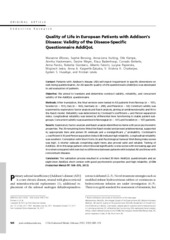| dc.contributor.author | Øksnes, Marianne | en_US |
| dc.contributor.author | Bensing, Sophie | en_US |
| dc.contributor.author | Hulting, Anna-Lena | en_US |
| dc.contributor.author | Kämpe, Olle | en_US |
| dc.contributor.author | Hackemann, Annika | en_US |
| dc.contributor.author | Meyer, Gesine | en_US |
| dc.contributor.author | Badenhoop, Klaus | en_US |
| dc.contributor.author | Betterle, Corrado | en_US |
| dc.contributor.author | Parolo, Anna | en_US |
| dc.contributor.author | Giordano, Roberta | en_US |
| dc.contributor.author | Falorni, Alberto | en_US |
| dc.contributor.author | Papierska, Lucyna | en_US |
| dc.contributor.author | Jeske, Wojciech | en_US |
| dc.contributor.author | Kasperlik-Zaluska, Anna A. | en_US |
| dc.contributor.author | Chatterjee, V. Krishna K. | en_US |
| dc.contributor.author | Husebye, Eystein Sverre | en_US |
| dc.contributor.author | Løvås, Kristian | en_US |
| dc.date.accessioned | 2014-08-22T07:28:17Z | |
| dc.date.available | 2014-08-22T07:28:17Z | |
| dc.date.issued | 2012-02 | eng |
| dc.identifier.issn | 1945-7197 | |
| dc.identifier.issn | 0021-972X | |
| dc.identifier.uri | https://hdl.handle.net/1956/8317 | |
| dc.description.abstract | Context: Patients with Addison’s disease (AD) self-report impairment in specific dimensions on well-being questionnaires. An AD-specific quality-of-life questionnaire (AddiQoL) was developed to aid evaluation of patients. Objective: We aimed to translate and determine construct validity, reliability, and concurrent validity of the AddiQoL questionnaire. Methods: After translation, the final versions were tested in AD patients from Norway (n = 107), Sweden (n = 101), Italy (n = 165), Germany (n = 200), and Poland (n = 50). Construct validity was examined by exploratory factor analysis and Rasch analysis, aiming at unidimensionality and fit to the Rasch model. Reliability was determined by Cronbach’s coefficient- and Person separation index. Longitudinal reliability was tested by differential item functioning in stable patient subgroups. Concurrent validity was examined in Norwegian (n = 101) and Swedish (n = 107) patients. Results: Exploratory factor analysis and Rasch analysis identified six items with poor psychometric properties. The 30 remaining items fitted the Rasch model and proved unidimensional, supported by appropriate item and person fit residuals and a nonsignificant X² probability. Crohnbach’s α-coefficient 0.93 and Person separation index 0.86 indicate high reliability. Longitudinal reliability was excellent. Correlation with Short Form-36 and Psychological General Well-Being Index scores was high. A shorter subscale comprising eight items also proved valid and reliable. Testing of AddiQoL-30 in this large patient cohort showed significantly worse scores with increasing age and inwomencompared withmenbutnodifference between patients with isolatedADand those with concomitant diseases. Conclusion: The validation process resulted in a revised 30-item AddiQoL questionnaire and an eight-item AddiQoL short version with good psychometric properties and high reliability. | en_US |
| dc.language.iso | eng | eng |
| dc.publisher | Endocrine Society | eng |
| dc.relation.ispartof | <a href="http://hdl.handle.net/1956/8326" target="blank">Glucocorticoid Treatment and Quality of Life in Addison’s disease</a> | eng |
| dc.title | Quality of Life in European Patients with Addison’s Disease: Validity of the Disease-Specific Questionnaire AddiQoL | en_US |
| dc.type | Peer reviewed | |
| dc.type | Journal article | |
| dc.description.version | publishedVersion | en_US |
| dc.rights.holder | Copyright 2012 by The Endocrine Society | |
| dc.identifier.doi | https://doi.org/10.1210/jc.2011-1901 | |
| dc.identifier.cristin | 928478 | |
| dc.source.journal | Journal of Clinical Endocrinology and Metabolism | |
| dc.source.40 | 97 | |
| dc.source.14 | 2 | |
| dc.source.pagenumber | 568-576 | |
